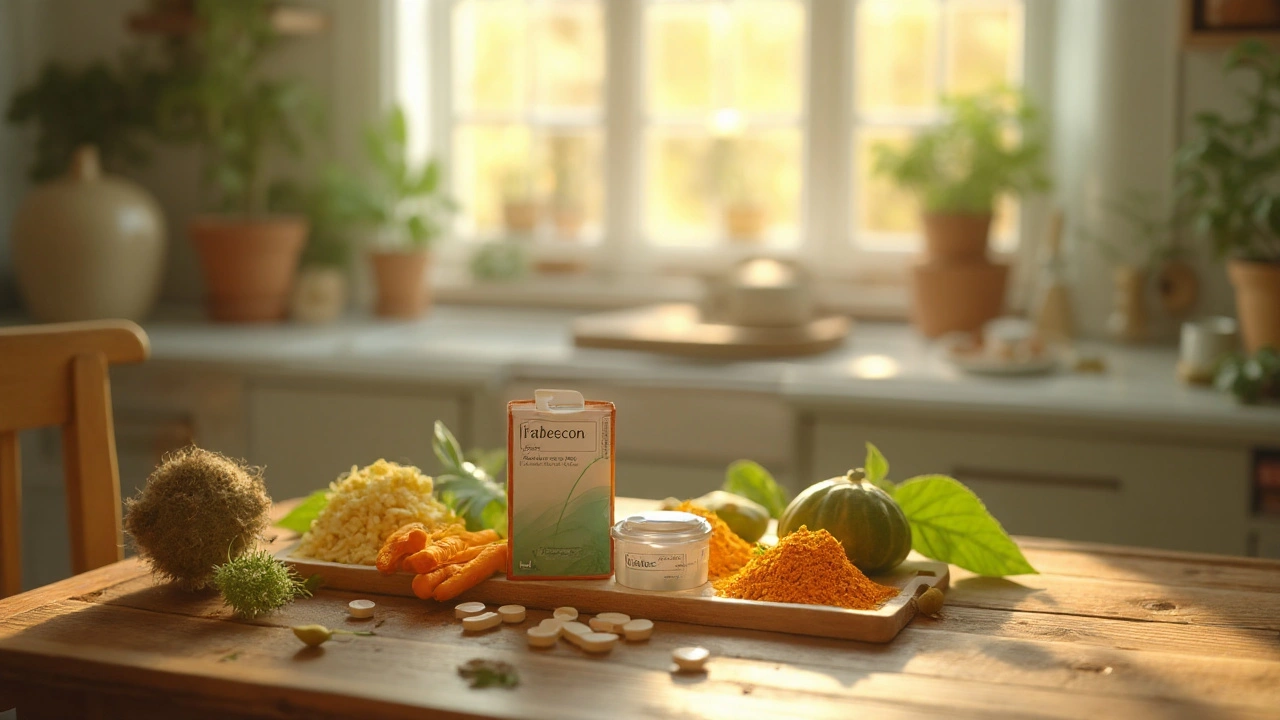Surprise: not every pill for diabetes management comes stamped in big letters from a Western pharmacy. Some people are reaching for an herbal blend instead. Diabecon, a supplement straight out of Ayurveda, promises to help control blood sugar without relying only on mainstream medicine. But does it work, or is it just clever marketing?
What Is Diabecon? The Ingredients Behind the Hype
Diabecon is a herbal supplement invented by Himalaya Herbal Healthcare and built on traditional Indian Ayurvedic medicine. Instead of single drugs, Diabecon is made up of multiple plant or mineral extracts, all bundled into one clear brown tablet. You’ll find gymnema (commonly called the “sugar destroyer”), shilajit, bitter melon, Indian kino tree, and even commiphora—all plucked from Eastern pharmacopoeias that have been around for centuries. Each of these has been researched for its potential to influence insulin production, block sugar absorption, or help the pancreas function better. Here’s a little secret about how it stands apart: while standard diabetes drugs target one pathway, Diabecon is designed to work on several at once.
Bitter melon, for example, can help cells absorb glucose, while gymnema may curb the sweet cravings before they become a problem. That blend means you’re not only improving sugar processing but also protecting your body from the rollercoaster highs and lows. Interestingly, shilajit—sometimes called “the destroyer of weakness” in Sanskrit—is actually a mineral pitch found in the Himalayas and has a long reputation for boosting overall vitality. It’s been tested for its antihyperglycemic effects, with some small studies showing reduced fasting blood sugar levels when taken alongside diet changes.
What’s crucial to note is that Diabecon is not a replacement for insulin, and anyone with type 1 diabetes shouldn’t swap out prescribed medications. But for those with mild type 2 or early blood sugar problems, it’s being used as a daily supplement to help keep things in balance. Manufacturers say the formula works best as part of an “integrative” plan—so think of it as a sidekick, not a star player.
How Diabecon Claims to Work: The Science (and Gray Areas)
Let’s look at what’s actually going on inside those tablets. The key claim is simple: Diabecon helps improve glucose metabolism and supports healthy pancreatic function. The blend includes herbs like gokshura (Tribulus terrestris) and Indian kino, which contain antioxidants meant to protect pancreatic cells—the ones that make insulin. Some ingredients target enzymes that help convert carbs to sugar, tweaking how your body absorbs and uses glucose.
Several animal studies hint at positive effects. For example, experiments with diabetic rats given Diabecon extract show modest improvements in fasting and post-meal glucose. The supplement also lowers HbA1c, a marker for long-term blood sugar control. Human studies are fewer and smaller, but one Indian research group gave patients Diabecon and documented a marked drop in both fasting glucose and LDL cholesterol after three months. Honest moment: sample sizes have been small, usually only 50 to 100 people, and there’s still not enough big, international data to claim Diabecon as game-changing standard care.
The mechanism isn’t totally unlocked. Best guess? Diabecon seems to slow the breakdown of carbs, decreases the absorption of glucose from the gut, and helps repair stressed-out beta cells in the pancreas. Some ingredients may even boost the ability of insulin itself—kind of turning up the volume knob on what little insulin your body makes. A 2023 analysis out of Bangalore confirms that patients using Diabecon with diet changes and exercise saw slightly better results than those using lifestyle changes alone, though the changes weren’t as dramatic as standard medications like metformin provide.
Who Uses Diabecon and Why?
The people who reach for Diabecon tend to fall into a few main groups. First up: folks newly diagnosed with prediabetes or borderline blood sugar issues, often younger adults who want to try "natural first". Then there are adults already on oral diabetes meds who use Diabecon as a sidekick when those drugs don’t fully control their numbers. Finally, there’s a big community interested in Ayurveda—people who want holistic, root-cause management and prefer ancient blends over one-size-fits-all pharmaceuticals.
My own neighbor, Sarah, started Diabecon after noticing that her energy crashed after meals, and her doctor flagged mildly high fasting glucose. She wasn’t ready for prescription pills and liked that Diabecon claims to support liver protection in addition to blood sugar balancing. She paired it with brisk morning walks and cut back on late-night snacking, and after six months, her numbers nudged lower. She’s not an outlier—thousands of people worldwide use Diabecon daily, hoping to dodge the need for stronger medications for as long as possible, or at least keep their numbers stable.
Still, it’s not a magic bullet. You can’t pop Diabecon and then binge on soda and cake. The best results typically come when the supplement is paired with lifestyle upgrades—cutting back refined carbs, daily walking, and stress management. Many users report that Diabecon feels "gentle" compared to harsh synthetic drugs, with fewer stomach upsets and less risk of severe blood sugar crashes. Doctors in big Indian cities sometimes recommend it for new, overweight patients, especially those resistant to trying medication first.
If you ask endocrinologists in the West, opinions split. Some say there’s not enough proof to recommend it outright. Others say—provided your doctor is in the loop and monitors your numbers—using Diabecon in addition to standard care isn’t risky. You just can’t swap your meds for it, and you need to pay attention to real test results, not hope. A lot of folks, like my friend Theresa when she was helping her mom balance sugar, combine these herbal approaches with regular blood tests and find that the mix gives them a sense of agency.

Real Benefits and Risks: What the Research Says
The appeal is obvious—pop a plant-derived pill instead of a prescription drug with a three-page list of side effects. But it’s not all upside. Most users report subtle improvement over months, and side effects tend to be minor. Some people notice mild nausea or more frequent urination in the first few weeks. But rare reactions like skin rash, diarrhea, or even liver strain can happen, though less often than with some synthetic drugs. Anyone who is pregnant, under 18, or taking lots of daily prescriptions needs to check with a doctor first—safe doesn’t always mean risk-free.
Real world tip: Diabecon may work best for those early in their diabetes journey. If you’ve got high fasting numbers (over 200 mg/dl), insulin or stronger oral medications still take priority. For those with moderate problems or borderline cases, Diabecon might help keep the numbers from climbing, or help you need lower doses of other meds. My colleague once tracked blood sugar with a continuous glucose monitor (CGM) while starting Diabecon and saw a modest 10-15 point drop in fasting numbers after eight weeks, with no wild swings.
It’s worth noting that Diabecon doesn’t just aim at blood sugar; it also contains liver-supportive herbs and antioxidants. This means that long-term, if it works for you, you may see slightly improved cholesterol and reduced "inflammation markers," not just better glucose. Traditional users swear by the kidney and nerve protection too, which modern science is just beginning to explore. But please—don’t fall for wild online claims that it “cures” diabetes. The research supports support, not total reversal.
How to Use Diabecon Wisely: Dosage, Precautions, and Hacks
Most recommendations say to take one or two tablets twice a day, usually before meals. It’s best to start with a lower dose and see how your body reacts. Consistency is key—popping Diabecon a few days a week won’t cut it. You need to give it at least 8-12 weeks before judging whether it’s making a difference. I always recommend folks track their blood sugar at home during the first month, so you can spot trends and make sure you’re not experiencing lows.
If you’re already taking prescription diabetes meds, always talk to your doctor first—herbs like gymnema can amplify the action of others, and you don’t want to overshoot and dip too low. Watch for reductions in appetite or unexpected tiredness; these can be signs your sugar is dropping faster than expected. Keep track of any allergies, and cut back or stop if you notice severe digestive upset or skin rashes.
Safe storage matters: keep the bottle away from little kids and in a cool, dry spot. Eleri, our seven-year-old, once tried to investigate Theresa’s herbal bottles—they look like candy to a curious kid, so we store ours on the highest shelf out of reach. Try to buy Diabecon from a reputable source—counterfeit supplements are a thing, especially from unfamiliar online stores. Check the label for seals of authenticity, batch numbers, and reviews from real customers.
Finally, remember that herbs work best alongside the usual self-care tweaks—think walking, skipping late-night sugary snacks, finding ways to chill after a rough day. If you have trouble sticking to one routine, try using a phone alarm or post-lunch reminder to help you remember the dose. The best outcomes seem to come when the supplement is part of an overall health groove, not just an excuse to ignore the rest of your habits.
Diabecon Myths, Misunderstandings, and Final Thoughts
One of the wildest myths floating around is that Diabecon will let you "eat like normal" without worrying about sugar levels. No herbal pill has that power—not even close. Another common misread is that if you’re using Diabecon, you need to avoid prescription medicine, but most experts say it’s safe to use alongside modern drugs as long as your doctor is tracking your progress.
People also sometimes assume that if it’s herbal, there can’t be any side effects, but that’s not true. Even plant extracts can cause issues—watch out for untrustworthy brands, high dosing, or hidden allergies. Another little-known fact: some people report the effects fade if you stop using it regularly; it’s not a cure but ongoing support.
If you’re thinking about trying Diabecon, bring your numbers, recent labs, and all current meds to your next doctor appointment and see if you’re a good fit. And don’t fall for overpriced knockoffs or one-size-fits-all health solutions. What works for one person doesn’t always work for another, and your experience may depend on genetics, diet, stress, and even your sleep habits.
It comes down to this: Diabecon stands out as a natural aid for gentle blood sugar management, especially for early-stage type 2 or borderline cases. The science is promising but not bulletproof, so it pays to treat it as one tool in your ongoing health toolkit. Be smart, stay informed, and treat your body with patience—it matters a lot more than any supplement ever could. If you’re curious about mixing old-world wisdom with modern science, Diabecon is definitely worth a closer look. But keep your expectations realistic, your doctors in the loop, and your daily habits as healthy as possible. That’s where the real magic happens.

